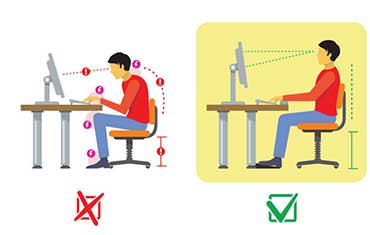POSTURE ASSESSMENT & MODIFICATIONS

Posture assessment and modifications are essential aspects of maintaining musculoskeletal health and preventing discomfort and injury.
Posture assessment involves evaluating the alignment of the body while standing, sitting, or moving. This assessment helps identify any imbalances, asymmetries, or deviations from the ideal posture that may contribute to pain or dysfunction.
Healthcare professionals, such as physical therapists or chiropractors, conduct thorough posture assessments using various methods, including observation, measurements, and specialized tools. They assess factors such as spinal curvature, shoulder alignment, pelvic tilt, and the positioning of the head and neck.
Based on the assessment findings, modifications to posture may be recommended to promote better alignment and alleviate strain on muscles and joints. These modifications often include ergonomic adjustments to workstations, chairs, and other environmental factors. Additionally, exercises and stretches may be prescribed to strengthen weak muscles, improve flexibility, and correct postural imbalances.
Consistent implementation of posture modifications is crucial for long-term musculoskeletal health. This may involve mindful awareness of body positioning throughout daily activities, regular breaks to stretch and adjust posture, and ergonomic improvements in both work and leisure environments.
By addressing posture imbalances and making appropriate modifications, individuals can reduce the risk of musculoskeletal problems such as back pain, neck pain, and repetitive strain injuries. Moreover, maintaining good posture can enhance overall physical comfort, increase energy levels, and improve functional performance in daily activities.
